
If you’ve been diving into the bitcoin synergy website, you’ve probably wondered about the safest way to store your digital gold. Let’s face it, Bitcoin isn’t just a hobby; it’s an investment, a lifeline for some, and even a revolution for others. But where should you stash it? On an exchange or in a cold wallet? Let’s break it down.
Exchanges: Convenience with a Side of Risk
Imagine exchanges as bustling marketplaces. They’re buzzing with activity, offering easy access to buying, selling, and trading Bitcoin. It’s like having your favorite coffee shop around the corner – convenient and always there when you need it.
But here’s the kicker: exchanges are also prime targets for hackers. Remember Mt. Gox? That debacle saw 850,000 Bitcoins vanish into thin air. And that wasn’t an isolated incident; several other exchanges have faced similar fates.
So why do people still use them? Well, they offer liquidity and ease of use that cold wallets can’t match. Plus, if you’re someone who trades frequently, keeping your assets on an exchange might seem like a no-brainer.
Cold Wallets: Fort Knox for Your Crypto
On the flip side, we have cold wallets – think of them as your personal safe buried deep underground. These are offline storage devices that keep your Bitcoin away from prying eyes and sticky fingers.
Cold wallets come in various forms: hardware wallets like Ledger or Trezor, paper wallets where you jot down private keys on good old-fashioned paper or even brain wallets where you memorize your key (though I wouldn’t recommend this unless you have a memory like an elephant).
The beauty of cold wallets is their security. Since they’re offline, hackers can’t touch them unless they physically get hold of your device or paper. But there’s a catch – lose the device or forget where you stashed that piece of paper, and poof! Your Bitcoins are gone forever.
Balancing Act: Security vs. Accessibility
Now let’s talk turkey – what suits you best depends on how often you need access to your Bitcoin and how much risk you’re willing to take.
If you’re HODLing (holding on for dear life) and see Bitcoin as a long-term investment akin to fine wine aging in a cellar, then cold storage is probably up your alley. It’s secure but less accessible – perfect if you’re not planning to move those coins anytime soon.
Conversely, if you’re wheeling and dealing daily or even weekly, keeping some funds on an exchange might be more practical despite the risks involved.
Diversify Like You Would With Stocks
Ever heard the saying “Don’t put all your eggs in one basket”? This applies here too! Many savvy investors split their holdings between exchanges and cold wallets. Keep what you need for trading on an exchange while locking away the bulk in cold storage.
This strategy gives you flexibility without sacrificing too much security. Think of it as having both a checking account (for everyday transactions) and a savings account (for long-term savings).
Trust Issues: Picking Reliable Exchanges
If storing some Bitcoin on an exchange sounds appealing despite its risks, make sure to pick reputable ones with strong security measures in place – two-factor authentication (2FA), withdrawal whitelists, etc., can go a long way in protecting your assets.
And always remember: never leave large amounts on any single platform indefinitely!
DIY Cold Storage Tips
For those leaning towards cold storage but feeling overwhelmed by tech jargon – fear not! Setting up isn’t rocket science:
1. Hardware Wallets: Follow manufacturer instructions religiously.
2. Paper Wallets: Use reputable generators offline.
3. Backup: Store backups securely but separately from originals.
4. Passphrases: Use complex passphrases only YOU know!
In short folks – weigh convenience against safety carefully before deciding where to park those precious satoshis!
Learning from Others’ Mistakes
Let’s take a moment to learn from others who’ve been burned. Take the case of QuadrigaCX – when its founder passed away, he took the private keys to $190 million worth of crypto with him. Yikes! This highlights the importance of not only securing your assets but also having a contingency plan.
Consider sharing access details with a trusted family member or using multi-signature wallets where multiple approvals are needed for transactions. It’s like having several keys to open a treasure chest – more secure and less risky if one key gets lost.
Stay Updated and Vigilant
The crypto world moves faster than a New York minute. What’s secure today might be vulnerable tomorrow. Keep an ear to the ground for updates on security practices and potential threats. Follow reputable sources, join forums, and don’t hesitate to ask questions.
Also, regularly update your software and firmware for both exchanges and cold wallets. Think of it as changing locks on your doors periodically – it keeps unwanted guests out.



